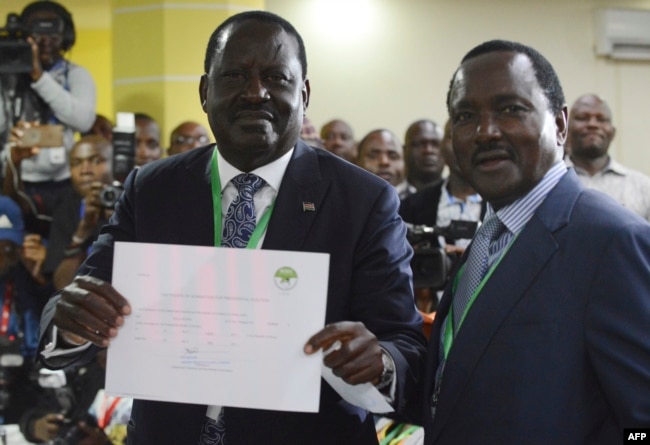 NAIROBI —
NAIROBI —
In Kenya, the official campaign period has begun as the electoral body clears candidates to run for the presidency. The commission is calling on the candidates to maintain peace during the August polls.
Kenya’s presidential campaign has begun with 70 days to the August elections. So far the Independent Electoral and Boundaries Commission has cleared seven candidates and rejected three because of logistical issues.
Addressing Jubilee Party supporters Monday in Nairobi, Deputy President William Ruto said he and the president would make a re-election bid.
“As you are aware today President Uhuru Kenyatta is going to present his papers to the IEBC given to him by Jubilee Party so that he can compete for the presidency on August 8th and we thank you for coming to escort him to the commission,” he said.
Kenyatta, who is seeking a second term, was the seventh candidate cleared by the IEBC.
The main opposition coalition led by former Prime Minister Raila Odinga was one of the presidential hopefuls to be cleared Sunday. Odinga, running for president for the fourth time, is expected to be Kenyatta's main challenger.
Electoral commission chairman Wafula Chebukati warned leaders against incitement.
“You have signed the accord of conduct both as political parties as well as candidates and as a commission we shall not hesitate to take any action if you breach that code of conduct. We want this country to be peaceful before, during and after this election,” said Chebukati.
The opposition agreed to hold a peaceful campaign. Odinga called on the commission to deliver an election that represents the will of the people.
“IEBC must leave up to its billing which is not only deliver free and fair but to ensure that those elections are truly free and fair,” he said.
Kenya is still haunted by the 2007 presidential election, won by Mwai Kibaki in a hotly-disputed vote. Post-election violence killed more than 1,100 people and forced the top parties into a power-sharing government.
Kenyatta's election in 2013 was peaceful, but was marred by accusations that he and Ruto had helped to organize the 2007 violence. The International Criminal Court eventually dropped charges of crimes against humanity for both men, citing a lack of evidence.











